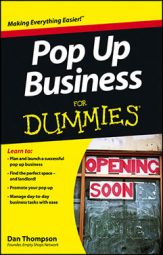Pop ups are an incredibly useful tool for doing business; they’re like a Swiss army penknife, which pops out in all sorts of useful ways. So what you do with your pop up is entirely up to you. The only limit is the edge of your imagination. Following are ten common pop up themes.
Have a message
Whether your pop up is testing a new idea, giving something special to valued customers or has a social purpose, make sure that your message is clear. Use your decor, kit-out, marketing and social media to convey your message and tell the story behind your brand.
Be local
Many people are living much more locally in the last few years. Social media has helped people form strong, local groups – global networks, for local action! And people are keen to ‘Shop Local’, too.
Make your pop up relevant to the place where it happens and the people who live nearby. Not only will you find your pop up more rewarding, it will be easier too, as local networks mobilise to support your work.
Do something different
Pop ups exist so that you can break out of the routine, be creative and do things differently. They’re still part of your core business, especially if you get your aims right in the first place and stick to them throughout the time you’re planning and running your pop up.
But pop ups are about innovation and give you the perfect chance to test and prototype new products and services. The risks aren’t as great as they would be if you took a long-term lease. You can be in and out in a matter of weeks, from the day you start planning to the day you get back to normal.
Change the rules
Pop ups, even the most corporate ones, have a mischievous, slightly anarchic spirit. They’re about finding new uses for old spaces, being temporary not permanent and trying new things. They’re not about doing things the way they’ve already been done.
Pop ups give you a chance to build new teams, push the boundaries and bend things to meet your aim.
Be a coffee shop
Some people predict that, in the future, everything will be a coffee shop that does something else as well.
What they really mean is that the social element of shopping will become more important. Add a coffee machine, stock up on biscuits and make cups of tea for your customers; you create a more friendly pop up and keep customers engaged for longer.
Don't hang around
Things that exist for a short time add interest and meaning to places.
Think about the number of events you go to that pop up; farmers’ markets, craft fairs, street performers and music festivals all bring life and vibrancy to the places where they happen. And nobody thinks of their website as a permanent, set in stone, unchanging thing.
Learn from failure
Creative people know that failure is more important than success; by making mistakes, you learn and do better next time. As playwright Samuel Becket said, ‘Try again. Fail again. Fail better.’
Entrepreneurs know that failure fosters success, too. Virgin Brides, Virgin Cosmetics, Virgin Megastores and Virgin Cola weren’t successes, but they all helped Sir Richard Branson become one of the richest people in Britain.
Pop ups are a perfect place to test and prototype, but it means some ideas will fail.
Recycle empty shops
Pop ups recycle old shops, old furniture and shop fittings, and many even sell recycled and remade goods, too.
Creating new things from old is common to lots of pop ups. Think of your pop up as part of the cycle of life on the high street. Make sure that you reduce, reuse and recycle. Whatever’s left at the end of your pop up, pass on and share.
Come together
Get people together to make your pop up work. Working with a group is more fun than working alone, so find people you can trust and let them do what they’re best at. Don’t micro-manage.
Pop ups are often shared spaces, with loose partnerships delivering mixed programmes of activity in their shops.
Have fun
Whether your pop up flies or crashes into the ground, it’s an unusual chance to try things out. You work with a great, handpicked team of people to achieve a common aim. You get a chance to be creative. You meet interesting visitors, too; pop ups do attract the local characters!
So make sure, amongst all the planning, the push to open on time and under the pressure of delivering, to have fun.

